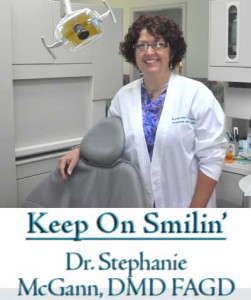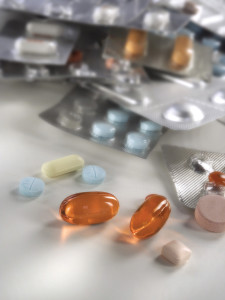Failing to mention them to your doc could have serious consequences
By Dr. Stephanie McGann, DMD FAGD, Columnist, The Times
 Dietary supplements have become a mega-business in this country. You can’t turn on the radio without hearing the “has not been approved to treat or cure any disease” disclaimer after every advertisement. While the supplements seem harmless enough, some combinations can have serious consequences. Telling your healthcare providers what medications you are taking, including supplements is important.
Dietary supplements have become a mega-business in this country. You can’t turn on the radio without hearing the “has not been approved to treat or cure any disease” disclaimer after every advertisement. While the supplements seem harmless enough, some combinations can have serious consequences. Telling your healthcare providers what medications you are taking, including supplements is important.
A dietary supplement is meant to provide nutrients above and beyond what someone would consume in their daily diet. Today these supplements can be found in grocery stores, drug stores, and even at the cash register at a gas station. They come in the form of tablets, capsules, powders, drinks, bars and even creams. Today’s supplements have gone way beyond the multivitamins. They claim to make us more alert, lose weight, be stronger, cure everything and do it all with a smile.
Are there risks? Too much of anything is not a good thing. Some supplements can increase the risk of bleeding. These can increase the risks before, during or after a surgical procedure. Other supplements can reduce the effectiveness of prescribed medications. For example patients who are prescribed blood thinners by their physician can make those drugs ineffective by taking a lot of vitamin K. St. John’s Wort can make oral contraceptives less effective. High doses of many vitamins and minerals can cause other systemic concerns such as organ failures and even birth defects. Be sure to list supplements you take regularly.
 What supplements have dental benefits? Calcium, very few adults get adequate calcium in their diet. Calcium helps to maintain strong teeth and bones. Some studies link gum disease severity with low calcium levels. Vitamins C, E and A are reported to help speed healing of gingival tissues. Grape Seed extract is a powerful antioxidant that seems to have ability for reducing the severity of infections such as periodontal disease. CoQ10 has been used to improve healing. Echinacea has been reported to inhibit the enzymes that break down tissues. This could help prevent some of the bone loss that occurs during sever periodontal diseases. Folic Acid also has been reported to have benefits for periodontal patients.
What supplements have dental benefits? Calcium, very few adults get adequate calcium in their diet. Calcium helps to maintain strong teeth and bones. Some studies link gum disease severity with low calcium levels. Vitamins C, E and A are reported to help speed healing of gingival tissues. Grape Seed extract is a powerful antioxidant that seems to have ability for reducing the severity of infections such as periodontal disease. CoQ10 has been used to improve healing. Echinacea has been reported to inhibit the enzymes that break down tissues. This could help prevent some of the bone loss that occurs during sever periodontal diseases. Folic Acid also has been reported to have benefits for periodontal patients.
Not all supplements are created equal. Since these botanical preparations are regulated as a food, there is no real uniformity. Each brand may use a different formulation or derive the sought-after nutrient from different sources. Compare the labels; one may need you to take 4 capsules to get the same dosage as just one capsule from another manufacturer. Watch out for scams –Since there is no evaluation of results many outcomes can be promised but none verified. Not all supplements are bad and many have their roots in the same plants as modern medicine. Supplements are really meant to assist your diet. They are regulated like food. There is no testing for effectiveness only that they are processed to food-quality standards and labeled accordingly.
According to the Academy of General Dentistry more than 70 percent of patients do not mention their supplement use when discussing their health history with their health care providers. This puts patients at risk for potentially serious side-effects from treatment or medications prescribed by the physician or dentist. Be sure to talk with your dentist or physician about any supplement choices.
Dr. Stephanie McGann, who has more than two decades of dental practice experience, is a resident of the Unionville area and along with her partner, Dr. Marie Scott, operates The Brandywine Smile Center, a family-friendly dental practice in Concordville. Dr. McGann has opened a new practice in Valley Township, Rainbow Valley Dental. She is a Fellow of the Academy of General Dentistry.





